The Law of Insurance: Nuisance, Obligations, Delegated Underwriting, Insurance Cover, and Liability
Added on 2023-05-30
25 Pages7516 Words160 Views
The Law of Insurance 1
Name of Student
Institution
Instructor
Date
Name of Student
Institution
Instructor
Date
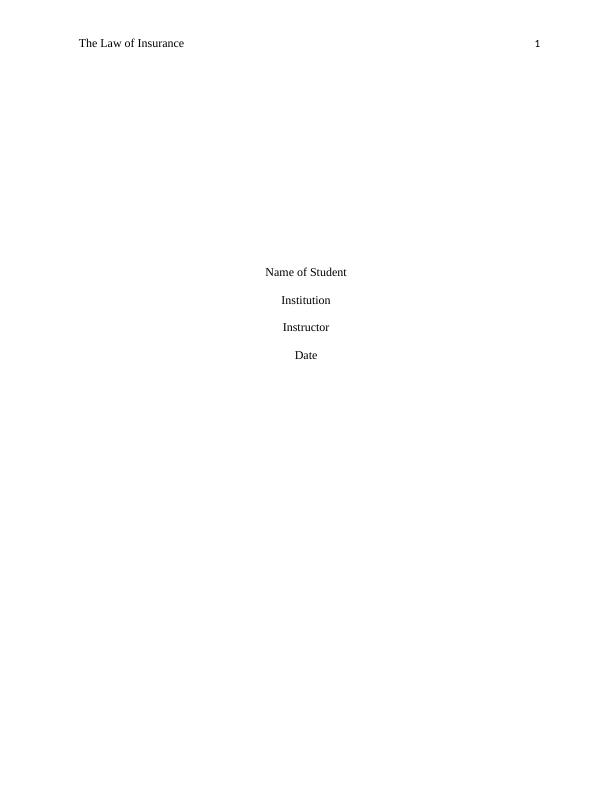
The Law of Insurance 2
Question 1
(a).
In this case scenario, the act of the new residents who have moved next to Moira’s house
run a business involving the use of noisy machinery. These new residents commit a tort as Moira
can no longer offer her counseling classes. The relevant tort here is nuisance. The tort of
nuisance is classified into private and public nuisance. The noise of the machinery business only
affects Moira and therefore, this is classified as private nuisance.
Public nuisance should be one that affects a section of the public or the general members
of the public; in this case scenario, only Moira whose counseling classes is affected and therefore
does not qualify as a public nuisance. The elements of nuisance in this case scenario include;
unreasonableness on the part of the new residents, the construction machinery is continuing,
there is a nexus between Moira and the nuisance committed by the new residents and there is
injury to Moira’s counseling classes.
There is unreasonable use of land by the new residents which has caused unreasonable
interference with Moira’s peaceful use and enjoyment of the adjoining premises.
(b) Remedies
The function of a remedy is to prevent the tort of nuisance from continuing. In this case
scenario, the most appropriate legal remedies include; Injunction and Damages.
Injunction –
Injunction in this instance would remove or destroy the nuisance completely. This is the
traditional method used to abate a nuisance. It is an order by the court that requires the party
causing the nuisance to refrain from doing acts that amounts to the nuisance. In the case of
Question 1
(a).
In this case scenario, the act of the new residents who have moved next to Moira’s house
run a business involving the use of noisy machinery. These new residents commit a tort as Moira
can no longer offer her counseling classes. The relevant tort here is nuisance. The tort of
nuisance is classified into private and public nuisance. The noise of the machinery business only
affects Moira and therefore, this is classified as private nuisance.
Public nuisance should be one that affects a section of the public or the general members
of the public; in this case scenario, only Moira whose counseling classes is affected and therefore
does not qualify as a public nuisance. The elements of nuisance in this case scenario include;
unreasonableness on the part of the new residents, the construction machinery is continuing,
there is a nexus between Moira and the nuisance committed by the new residents and there is
injury to Moira’s counseling classes.
There is unreasonable use of land by the new residents which has caused unreasonable
interference with Moira’s peaceful use and enjoyment of the adjoining premises.
(b) Remedies
The function of a remedy is to prevent the tort of nuisance from continuing. In this case
scenario, the most appropriate legal remedies include; Injunction and Damages.
Injunction –
Injunction in this instance would remove or destroy the nuisance completely. This is the
traditional method used to abate a nuisance. It is an order by the court that requires the party
causing the nuisance to refrain from doing acts that amounts to the nuisance. In the case of
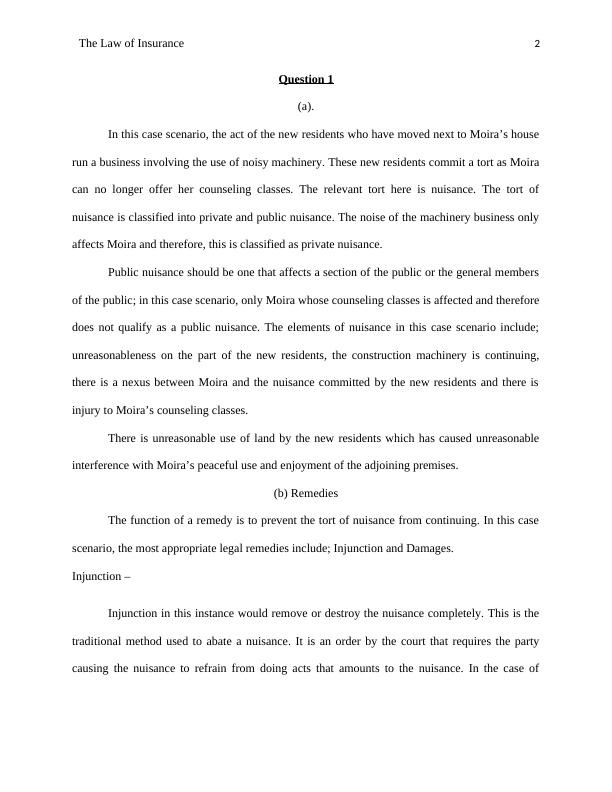
The Law of Insurance 3
Kennaway v Thompson [1981] QB 88 Court of Appeal, the court granted an injunction to stop a
nuisance and stated that damages was not adequate in the circumstances.
Damages –
This is a compensatory form of payment in form of money for a wrong done to another
person. It is a discretionary remedy used where the threat or nuisance is not permanent but has
led to economic loss on the part of the claimant. In this case, Moira is likely to lose her
counseling students. In Pacific Engineering Ltd v Haji Ahmad Rice Mill Ltd, it was stated that a
person can bring an action and claim damages for injury or loss resulting from nuisance as well
as sue for injunction.
Question 2
(a)
Parties to a contract have rights and obligations under the contract. A contract is an
agreement between two or more parties intended to be legally binding and enforceable in a court
of law. There are essential elements required for a contract to be formed. They include; offer,
acceptance, intention, illegality, capacity and consideration. Rights and obligations only arise
after a valid contract has been formed.
In this case scenario, the issue is whether there was a valid contract giving Paul an
obligation to pay ABC plc his insurance premium at the time of contract formation. From the
terms of the contract, payment of premium was on a monthly basis. This means that the
consideration was a promise by Paul to pay premium in exchange for insurance cover. Payment
could be made at any time within the month. This gave rise to the obligation to make payment
within a reasonable time in the course of the month. He was therefore required to make a deposit
in his account so that premium can be deducted by ABC plc. According to LSW301, premium in
Kennaway v Thompson [1981] QB 88 Court of Appeal, the court granted an injunction to stop a
nuisance and stated that damages was not adequate in the circumstances.
Damages –
This is a compensatory form of payment in form of money for a wrong done to another
person. It is a discretionary remedy used where the threat or nuisance is not permanent but has
led to economic loss on the part of the claimant. In this case, Moira is likely to lose her
counseling students. In Pacific Engineering Ltd v Haji Ahmad Rice Mill Ltd, it was stated that a
person can bring an action and claim damages for injury or loss resulting from nuisance as well
as sue for injunction.
Question 2
(a)
Parties to a contract have rights and obligations under the contract. A contract is an
agreement between two or more parties intended to be legally binding and enforceable in a court
of law. There are essential elements required for a contract to be formed. They include; offer,
acceptance, intention, illegality, capacity and consideration. Rights and obligations only arise
after a valid contract has been formed.
In this case scenario, the issue is whether there was a valid contract giving Paul an
obligation to pay ABC plc his insurance premium at the time of contract formation. From the
terms of the contract, payment of premium was on a monthly basis. This means that the
consideration was a promise by Paul to pay premium in exchange for insurance cover. Payment
could be made at any time within the month. This gave rise to the obligation to make payment
within a reasonable time in the course of the month. He was therefore required to make a deposit
in his account so that premium can be deducted by ABC plc. According to LSW301, premium in
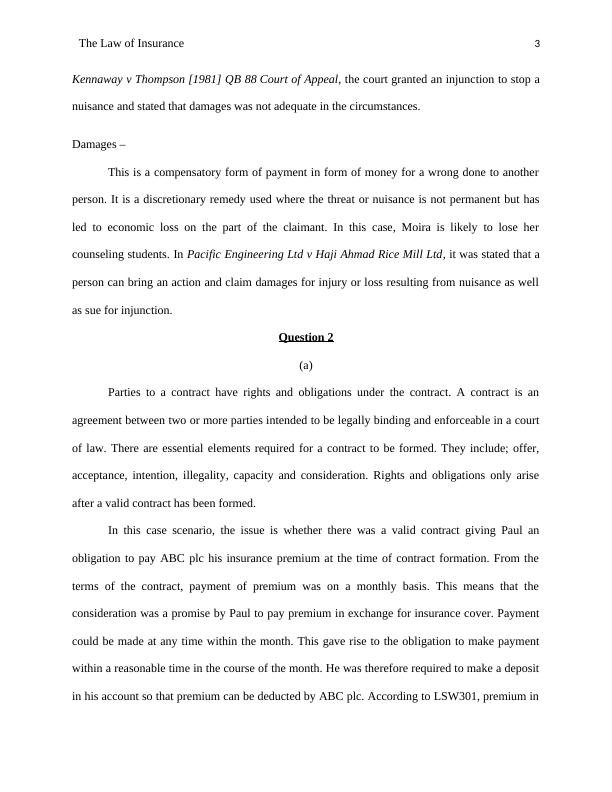
The Law of Insurance 4
an insurance contract should be paid within a reasonable time. The promise to pay in this
instance is the consideration giving rise to the obligation by Paul to pay premium at the time of
entering into the contract or within reasonable time.
(b)
The insurance contract entered into between Paul and ABC plc created a continuing
obligation on both parties to perform their respective parts of the bargain. Paul had an obligation
to perform his part of the bargain during the pendency of the contract. Paul has however
committed a breach of the terms of the contract by not making deposits in his account. ABC plc
discovers this and cancels the policy without informing Paul and giving him time to make good
the breach. Though Paul had a continuing obligation to pay premium, ABC plc also had a
corresponding obligation to keep Paul’s motor vehicle insured. A party in breach of a contractual
obligation should be allowed an opportunity to rectify or make good the breach before a contract
is terminated. Though Paul had a continuing obligation, he can challenge the cancellation of the
basis that he was not informed about the lack of funds in his account so as to make a deposit and
therefore ABC plc did not act in good faith.
Question 3
(a)
A delegated underwriting is used to describe an arrangement between a managing agent
of say a syndicate delegate authority to another company to negotiate and conclude contracts on
behalf of a syndicate. A contract of delegation lasts for twelve months and is renewable. To end
such a contract, AV can do it through:
Reviews
an insurance contract should be paid within a reasonable time. The promise to pay in this
instance is the consideration giving rise to the obligation by Paul to pay premium at the time of
entering into the contract or within reasonable time.
(b)
The insurance contract entered into between Paul and ABC plc created a continuing
obligation on both parties to perform their respective parts of the bargain. Paul had an obligation
to perform his part of the bargain during the pendency of the contract. Paul has however
committed a breach of the terms of the contract by not making deposits in his account. ABC plc
discovers this and cancels the policy without informing Paul and giving him time to make good
the breach. Though Paul had a continuing obligation to pay premium, ABC plc also had a
corresponding obligation to keep Paul’s motor vehicle insured. A party in breach of a contractual
obligation should be allowed an opportunity to rectify or make good the breach before a contract
is terminated. Though Paul had a continuing obligation, he can challenge the cancellation of the
basis that he was not informed about the lack of funds in his account so as to make a deposit and
therefore ABC plc did not act in good faith.
Question 3
(a)
A delegated underwriting is used to describe an arrangement between a managing agent
of say a syndicate delegate authority to another company to negotiate and conclude contracts on
behalf of a syndicate. A contract of delegation lasts for twelve months and is renewable. To end
such a contract, AV can do it through:
Reviews
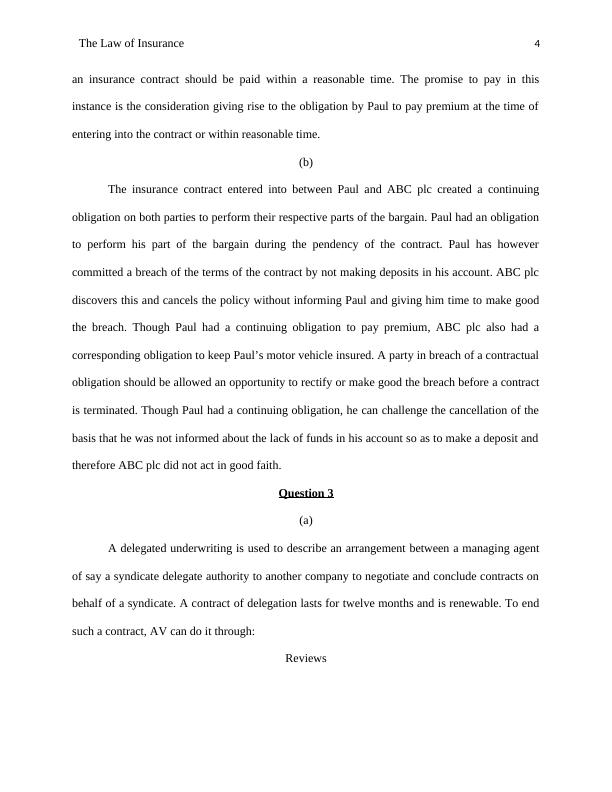
The Law of Insurance 5
A contract of delegation is subject to review every twelve months. During the review, the
insurer has the discretion to terminate certain contracts of delegation that seems not to be
undertaking their mandate as required of them under the contract. During such review, the
insurer can decide to terminate all the contracts of delegation on the basis that such contracts
have failed to acquire or obtained their mandate under the contract.
Cancellation
A contract of delegation can be terminated through cancellation. This is done where there
are myriad problems with the performance of the contract such as failure to meet requirements
on regulation. In undertaking a cancellation, it is necessary that the relevant and required notices
are issued so as to comply with all the legal requirements. The notice of cancellation should be
one that takes effect within the time indicated in the notice.
Non-renewal
A delegated underwriting contract can be terminated through non-renewal. This can be
done for just cause such as failure to meet an underwriting target as well as changes in the offices
of the cover holder.
(b)
A managing director is the soul and mind of a company. He or she is the one involved in
policy making and the day to day operations of a company. The death of such a person makes a
company ineffective as it will not be able to make and take decisions as before.
The managing director is the one who implements and directs the operations of a company
towards the realization of its targets both long term and short term. The death therefore will
hinder the company from achieving its set objectives and strategies and in the long run, leads to
loss of business. The chain of communication is broken when a managing director dies. The
A contract of delegation is subject to review every twelve months. During the review, the
insurer has the discretion to terminate certain contracts of delegation that seems not to be
undertaking their mandate as required of them under the contract. During such review, the
insurer can decide to terminate all the contracts of delegation on the basis that such contracts
have failed to acquire or obtained their mandate under the contract.
Cancellation
A contract of delegation can be terminated through cancellation. This is done where there
are myriad problems with the performance of the contract such as failure to meet requirements
on regulation. In undertaking a cancellation, it is necessary that the relevant and required notices
are issued so as to comply with all the legal requirements. The notice of cancellation should be
one that takes effect within the time indicated in the notice.
Non-renewal
A delegated underwriting contract can be terminated through non-renewal. This can be
done for just cause such as failure to meet an underwriting target as well as changes in the offices
of the cover holder.
(b)
A managing director is the soul and mind of a company. He or she is the one involved in
policy making and the day to day operations of a company. The death of such a person makes a
company ineffective as it will not be able to make and take decisions as before.
The managing director is the one who implements and directs the operations of a company
towards the realization of its targets both long term and short term. The death therefore will
hinder the company from achieving its set objectives and strategies and in the long run, leads to
loss of business. The chain of communication is broken when a managing director dies. The
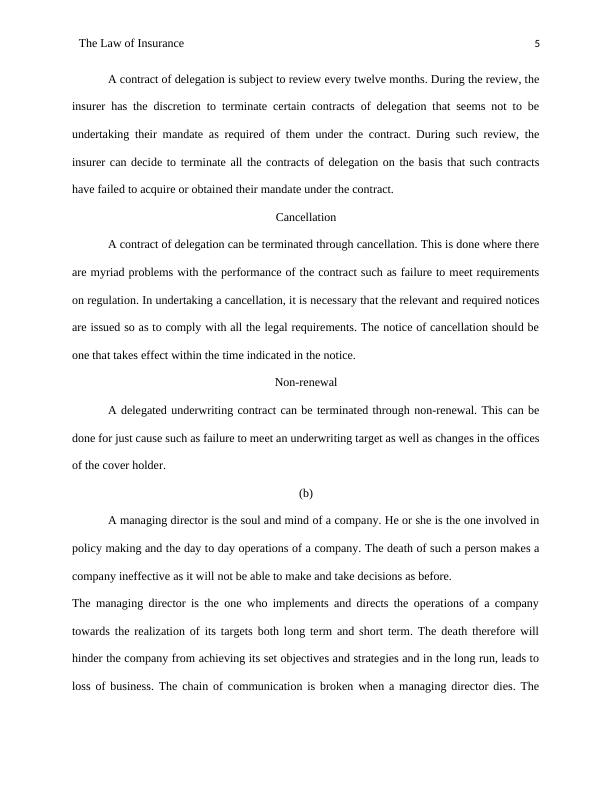
The Law of Insurance 6
managing director is the link between the company and third parties such as customers and
clients. His or her death breaks that link which in turn leads to loss of business for the company.
The death will therefore affect greatly the operations of JT.
Question 4
(a)
Her brother:
The brother being a partner entitles him to insurance to protect the partnership upon
death. Covering the brother as a junior partner enables Sheetal to be able to make necessary
adjustments in the partnership business and avoid or minimize the negative effects of his death.
The insurance policy can be written in such a way that the company is listed as a beneficiary in
addition to the family members as next of kin under the insurance contract. This will allow the
partnership to be paid compensation for loss of a partner.
Her father:
As an employee of the partnership business, Sheetal can choose a permanent life
insurance for the father. This runs for a fixed period of time. The beneficiaries should be the
family members and children so that the death of the father does not cause financial burden on
the business. This will ensure that all the expenses are paid by the insurance company and as a
result, the partnership will not spend money upon the death of the employee. The company can
also be named as a beneficiary under the insurance contract.
Her friend
Sheetal’s friend owes her money. Sheetal therefore has interest as a creditor. In taking out
insurance cover, she can choose the permanent life insurance policy option which has an
investment option as well. The partnership business can be listed as a beneficiary for the
managing director is the link between the company and third parties such as customers and
clients. His or her death breaks that link which in turn leads to loss of business for the company.
The death will therefore affect greatly the operations of JT.
Question 4
(a)
Her brother:
The brother being a partner entitles him to insurance to protect the partnership upon
death. Covering the brother as a junior partner enables Sheetal to be able to make necessary
adjustments in the partnership business and avoid or minimize the negative effects of his death.
The insurance policy can be written in such a way that the company is listed as a beneficiary in
addition to the family members as next of kin under the insurance contract. This will allow the
partnership to be paid compensation for loss of a partner.
Her father:
As an employee of the partnership business, Sheetal can choose a permanent life
insurance for the father. This runs for a fixed period of time. The beneficiaries should be the
family members and children so that the death of the father does not cause financial burden on
the business. This will ensure that all the expenses are paid by the insurance company and as a
result, the partnership will not spend money upon the death of the employee. The company can
also be named as a beneficiary under the insurance contract.
Her friend
Sheetal’s friend owes her money. Sheetal therefore has interest as a creditor. In taking out
insurance cover, she can choose the permanent life insurance policy option which has an
investment option as well. The partnership business can be listed as a beneficiary for the

End of preview
Want to access all the pages? Upload your documents or become a member.
Related Documents
Defective Insurance Contracts: Case Study Analysislg...
|22
|5961
|440
Tort Law, Liability, and Damageslg...
|14
|4326
|67
Assignment on The English Tort Lawlg...
|12
|3622
|339
Legal Issues in Business Organizations Tourism and Events Organizations Assessment for 2021lg...
|8
|2481
|370
Tort Law: Private Nuisance, Trespass, and Defamationlg...
|7
|1707
|56
Tort Law: Definition, Types, and Remedieslg...
|14
|2879
|281
